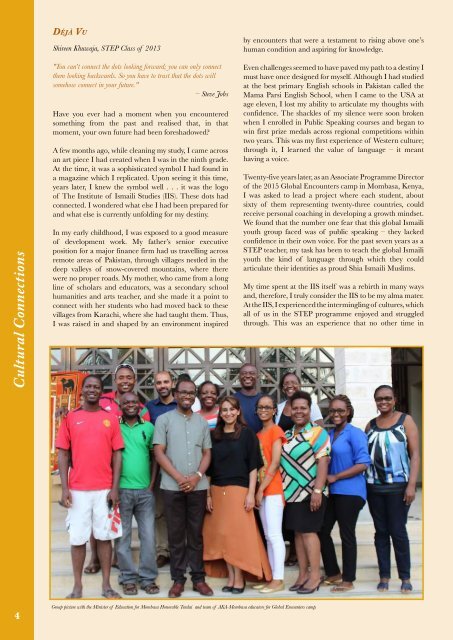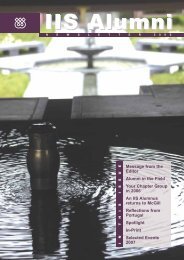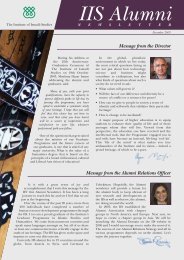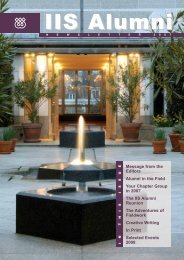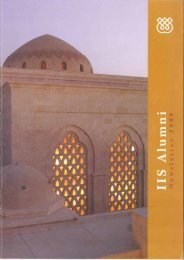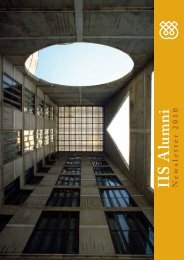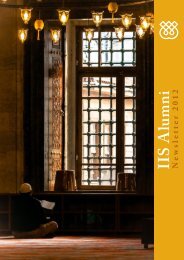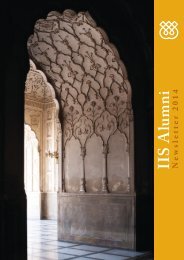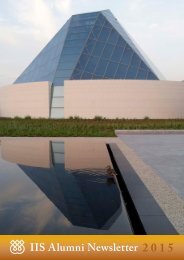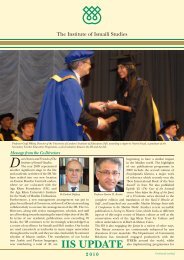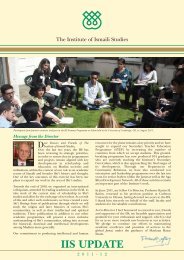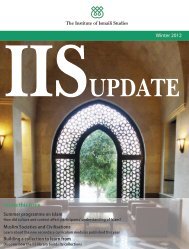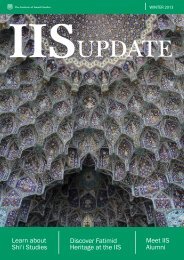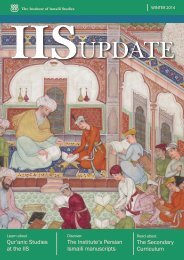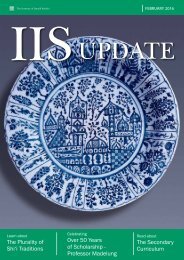IIS Alumni Booklet 2016
You also want an ePaper? Increase the reach of your titles
YUMPU automatically turns print PDFs into web optimized ePapers that Google loves.
Déjà Vu<br />
Shireen Khuwaja, STEP Class of 2013<br />
by encounters that were a testament to rising above one’s<br />
human condition and aspiring for knowledge.<br />
Cultural Connections<br />
"You can’t connect the dots looking forward; you can only connect<br />
them looking backwards. So you have to trust that the dots will<br />
somehow connect in your future."<br />
– Steve Jobs<br />
Have you ever had a moment when you encountered<br />
something from the past and realised that, in that<br />
moment, your own future had been foreshadowed?<br />
A few months ago, while cleaning my study, I came across<br />
an art piece I had created when I was in the ninth grade.<br />
At the time, it was a sophisticated symbol I had found in<br />
a magazine which I replicated. Upon seeing it this time,<br />
years later, I knew the symbol well . . . it was the logo<br />
of The Institute of Ismaili Studies (<strong>IIS</strong>). These dots had<br />
connected. I wondered what else I had been prepared for<br />
and what else is currently unfolding for my destiny.<br />
In my early childhood, I was exposed to a good measure<br />
of development work. My father’s senior executive<br />
position for a major finance firm had us travelling across<br />
remote areas of Pakistan, through villages nestled in the<br />
deep valleys of snow-covered mountains, where there<br />
were no proper roads. My mother, who came from a long<br />
line of scholars and educators, was a secondary school<br />
humanities and arts teacher, and she made it a point to<br />
connect with her students who had moved back to these<br />
villages from Karachi, where she had taught them. Thus,<br />
I was raised in and shaped by an environment inspired<br />
Even challenges seemed to have paved my path to a destiny I<br />
must have once designed for myself. Although I had studied<br />
at the best primary English schools in Pakistan called the<br />
Mama Parsi English School, when I came to the USA at<br />
age eleven, I lost my ability to articulate my thoughts with<br />
confidence. The shackles of my silence were soon broken<br />
when I enrolled in Public Speaking courses and began to<br />
win first prize medals across regional competitions within<br />
two years. This was my first experience of Western culture;<br />
through it, I learned the value of language – it meant<br />
having a voice.<br />
Twenty-five years later, as an Associate Programme Director<br />
of the 2015 Global Encounters camp in Mombasa, Kenya,<br />
I was asked to lead a project where each student, about<br />
sixty of them representing twenty-three countries, could<br />
receive personal coaching in developing a growth mindset.<br />
We found that the number one fear that this global Ismaili<br />
youth group faced was of public speaking – they lacked<br />
confidence in their own voice. For the past seven years as a<br />
STEP teacher, my task has been to teach the global Ismaili<br />
youth the kind of language through which they could<br />
articulate their identities as proud Shia Ismaili Muslims.<br />
My time spent at the <strong>IIS</strong> itself was a rebirth in many ways<br />
and, therefore, I truly consider the <strong>IIS</strong> to be my alma mater.<br />
At the <strong>IIS</strong>, I experienced the intermingling of cultures, which<br />
all of us in the STEP programme enjoyed and struggled<br />
through. This was an experience that no other time in<br />
4<br />
Group picture with the Minister of Education for Mombasa Honorable Tendai and team of AKA-Mombasa educators for Global Encounters camp.


